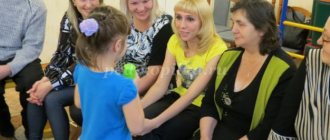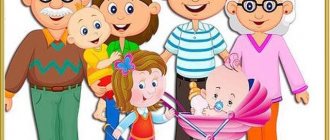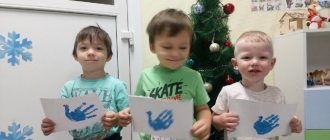Speech by a senior teacher at a general parent meeting “Preschool educational institution – family – ways of cooperation”
General parent meeting
Speech by senior teacher “Preschool educational institution – family – ways of cooperation”
There has long been a debate about what is more important in the development of personality: family or public education. Some great teachers leaned in favor of the family, others gave the palm to public institutions. And parents very often blame kindergartens and schools for their children’s lack of knowledge and education.
Let's try to answer the question
- Who should be involved in raising a child: a kindergarten or a family? Or should the work be done together?
If you look at the regulatory documents, it immediately becomes clear that parents are responsible for raising children, and they are the first teachers; all other social institutions (kindergartens, schools) are called upon to help, support, guide, and complement their educational activities.
Today, a new system of preschool education is being established in society. Federal state educational standards for preschool education, the law “On Education in the Russian Federation” oblige teachers and parents to become equally responsible participants in the educational process.
During the child’s stay in kindergarten, we (children, teachers and parents )
make a triangle.
Child
Educator Parent
At the head of the triangle, of course, is the child. He, learning new things
, discovers myself
(what I can do, what I can do, what I am capable of)
. The task of adults is to help him in this difficult matter. We should not forget about society, which plays a big role in the development of a child.
— What do you think will happen to a three-legged stool if one leg breaks? (will fall)
Remember I. Krylov’s fable “Swan, Cancer and Pike”
: “When there is no agreement among the comrades, their business will not go well, and what will come out of it is nothing but torment.”
From this it follows that we should combine our efforts to make children comfortable and interesting in kindergarten
.
A teacher is an employee of a preschool institution who is not only directly responsible for the life and health of the children entrusted to him, but also carries out educational work in accordance with the kindergarten program. A parent is a “customer” who brings his child to kindergarten and wants the most favorable conditions to be created for his loved one (and often his only child). The parent has one (two, three) child. A teacher has an average of 15-20, sometimes about 30. And this also needs to be taken into account, because the amount of personal attention for each child is inversely proportional to the number of children. And he is also interested in providing children with favorable conditions, without forgetting about his educational responsibilities.
Today, parents make a huge number of demands on the kindergarten and the teacher in the first place, and often quite contradictory. And this is understandable. Each family has its own educational system, and what is good for one child is categorically not accepted by other parents. Some demand that the child return from a walk clean, others are indignant that the teacher does not allow the child to jump and climb wherever he wants, someone asks that children not be walked when it’s cool outside, someone, on the contrary, goes complain to the manager that the children are kept in a group instead of going for a walk.
Be friendly and polite to the teacher. Unfortunately, some parents do not even consider it necessary to say hello or goodbye to the teacher when bringing their child to kindergarten.
Don’t forget to ask yourself about how your child spent his time in kindergarten, what he did, what he ate, who he played with. If you talk about this with the teacher, he will definitely begin to look more closely at your child during the day, so that later he will be able to answer your questions in more detail. Also, the teacher will be more relaxed about your requests and comments, because in his eyes you will be perceived as a caring and caring parent. It is much more difficult to establish contacts with those parents who remember the existence of the teacher only when something does not suit them.
However, sometimes situations arise when conflict cannot be avoided. What to do if you have complaints about the work of a teacher?
Do you think that in kindergarten there is little work with the child? Each preschool institution, including ours, works according to an educational program, in accordance with which a “grid” of classes is drawn up for the week. Class time depends on the age of the children - in preparatory classes the duration is 30 minutes. But if at home you don’t devote time to games, reading books with your child, and don’t reinforce what children learn in kindergarten, believing that the child will have enough classes in kindergarten, you shouldn’t count on good results, but in order to know what to consolidate with your child at home, ask the teachers what they went through today, if anything needs to be repeated or reinforced.
I would like to dwell on the development of the child’s fine motor skills, that is, his hands and fingers. You are now on the eve of entering school; a little more time will pass and your child will become a first-grader. This is necessary so that the child in the first grade does not have problems with writing. Many parents make a big mistake by forbidding their child to pick up scissors. Yes, you can get hurt with scissors, but if you talk to your child about how to handle scissors correctly, what you can do and what you can’t do, then the scissors will not pose a danger. Modeling is very useful for the development of fine motor skills, and children really like to sculpt various koloboks, animals and other figures. Learn finger exercises with your child. In addition, you can train a preschooler’s hand by drawing, shading, tying shoelaces, and stringing beads. Give children at home, instead of phones, tablets and cartoons, more opportunity to do something with their hands: draw, sculpt, glue, cut out, without thinking that the child might get dirty or ruin something.
In conclusion of my speech, I would like to say: Kindergarten is neither heaven nor hell for a child, it is the same stage in his life as school or college. And it depends on you and me what this stage of his life will be like.
CHILD
Educator Parent
From the experience of a senior teacher. Parents' meeting at the preschool educational institution
How to properly organize a parent meeting at a preschool educational institution?
The preschool teacher communicates daily with children and parents, sees their problems, difficulties, as well as the positive experiences of each family. One of the tasks of communication between a teacher and parents is to reveal to parents important aspects of the child’s mental development and help them build the right pedagogical strategy. In resolving these issues, parent meetings are indispensable, as they are an effective form of communication between educators and parents. However, parents are busy people; sometimes they don’t have time to talk to the teacher, come to a meeting, or they think that they already know everything about their child. In this case, the teacher must know how to interest parents in the necessary pedagogical information, and then how to effectively organize a parent meeting.
Parent meeting It is at meetings that the teacher has the opportunity to familiarize parents with the tasks, content, and methods of raising preschool children in a kindergarten and family setting. During the meeting, the main burden falls on the report. This material can be used for conducting oral and written consultations with parents, as well as other forms of work. The teacher is required to have a creative approach to the material: searching for new examples; using their own methods of activating parents, aimed at making listeners interested in the problem being studied, at creating associations with their own experience of raising children, and at rethinking their parental position. In this case, it is necessary to take into account the parents’ need for knowledge. • psychological training; • Master Class; • joint activities between children and parents; • Open Day; • screening of theatrical productions. Preparing a parent meeting 1. A week before the meeting, you can conduct a survey of parents on the topic of the meeting. Questionnaires are filled out at home before the meeting and their results are used during the meeting. 2. To activate parents and ensure their attendance at the meeting, it is advisable to make invitations to each family in the form of applications, designs, taking into account the theme of the meeting. It is important that children take part in making secret invitations for parents. Invitations are distributed a week before the meeting. 3. In accordance with the theme of the meeting, create original leaflets with tips. The content of the memos should be brief, the text should be printed in large font. 4. Our kindergarten uses such forms of attracting parents to parent-teacher meetings as: preparing competitions, exhibitions, and crafts on the theme of the meeting. At the same time, both children and their parents participate in competitions. All prepared works are exhibited before the meeting, and the teacher introduces parents to samples of work. At the meeting itself, parents choose the best work, and the winner is awarded a prize. 5. An audio recording of children’s answers to questions on the topic of the meeting can be used as one of the forms of activating parental attention. 6. Occasionally invite a fairy-tale character to a meeting. 7. We attract the attention of parents to the meeting by creating homemade posters on the topic of the meeting. 8. It is advisable to hold parent committee meetings a month before the meeting. Immediately before the meeting, it is necessary to:
• prepare furniture on which it would be comfortable for parents to sit.
You can arrange tables and chairs in a circle, put cards on them with the names and patronymics of parents, • prepare pens and sheets of paper so that they can write down the information they are interested in, as well as pencils, children’s work on modeling, drawing, and appliqué. • consider who will provide child care during the meeting and how. Conducting a parent meeting A parent meeting traditionally consists of 3 parts: introductory, main and “miscellaneous”.
The meeting time is 1 hour. (40 minutes with parents and 20 minutes with children). 1.
The introductory part
is designed to organize parents, create an atmosphere of goodwill and trust, concentrate their attention, and motivate them to solve problems together.
This can be done by communicating the topic, the form of the meeting, or through short games and activities. You can create a certain musical background: the sounds of a guitar, piano, tape recording, which will accompany the words of the presenter. 2. The main part
of the meeting can be divided into two or three stages.
As a rule, this part begins with a speech by the group teacher, senior teacher or other preschool specialists, covering the theoretical aspects of the problem under consideration. The message should be short, since by the end of the working day the stability of attention decreases. The main thing is that parents are not just passive listeners. It is necessary to ask questions to the listeners, give examples from the practice of raising children in families and kindergartens, analyze pedagogical situations, offer parents to watch video clips of classes with children, games, walks, etc. You should not reproach or lecture your parents. More often you need to use moments from the lives of children in the group as examples. When talking about unwanted actions of children, there is no need to mention their last names. During their communication, teachers should avoid making claims against parents and children, discussing the personality of a particular child; One should not state the failures of children, the main thing is to jointly develop ways to solve the problems under discussion. It is better to have a conversation in soft lighting. Transitions from one situation to another can be separated by a short musical pause. If possible, it is better to stage the situations being analyzed. To illustrate your ideas and considerations, you can use tape and video recordings, photographs and interviews of children in the group, diagrams and graphs, visually presented theses and speeches. All this will contribute to a better understanding of the theme of the meeting. When conducting this part of the meeting, you can also use the following methods: lecture, discussion, conference, which can also be separate forms of work with the families of pupils. 3. In the third part of the parent meeting - “miscellaneous”
- issues of maintaining a child in kindergarten, leisure activities, and organizing joint events between the family and the preschool educational institution are discussed. It is recommended to think through in advance several options for solving the problem that will be offered to parents for discussion, agree with those of them who can help, take responsibility, etc. Some issues need to be resolved in advance with the parent committee. At the end of the meeting, it is necessary to summarize the meeting, listing the decisions made on each of the issues discussed, recorded in the minutes. Meetings can be held in the form of question-and-answer evenings, oral journals, talk shows, etc. Despite the differences in these forms, they are united by one meaning - to give parents knowledge about raising their own child, to interest them in the problems of education, and to stimulate them to reconsider their educational position.
Download How to properly organize a parent meeting in a preschool educational institution?
We recommend watching:
Parent meeting in the senior group of the kindergarten Pedagogical council in the kindergarten on the topic: Artistic and aesthetic development of preschoolers Methodology room in the kindergarten in accordance with the Federal State Educational Standard Self-education of a preschool teacher in accordance with the Federal State Educational Standard
Similar articles:
Parent meeting in kindergarten. My child
Summary of the parent meeting in the first junior group
Summary of the final parent meeting in the second junior group
Scenario for a parent meeting in the senior group “The role of home and family in shaping the personality of a preschooler”
Summary of the parent meeting in kindergarten “My Safe Way Home”




